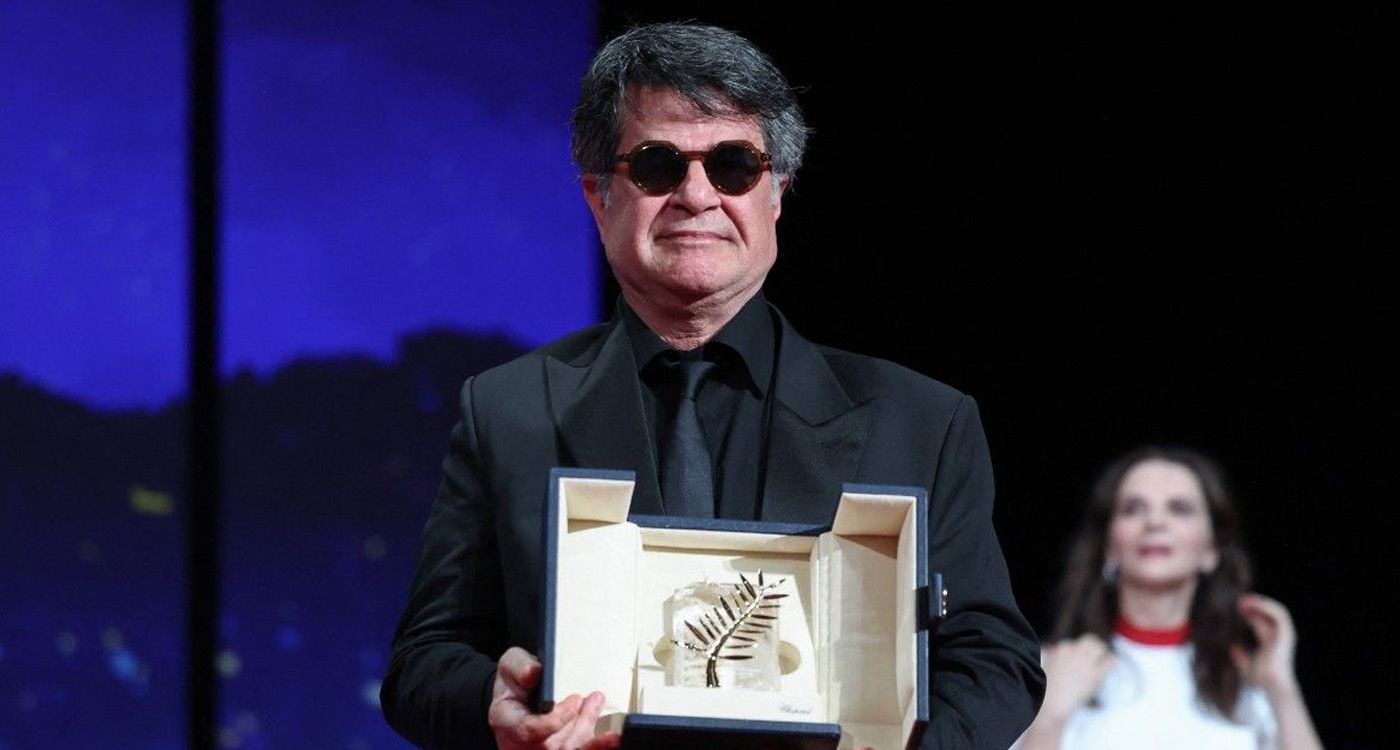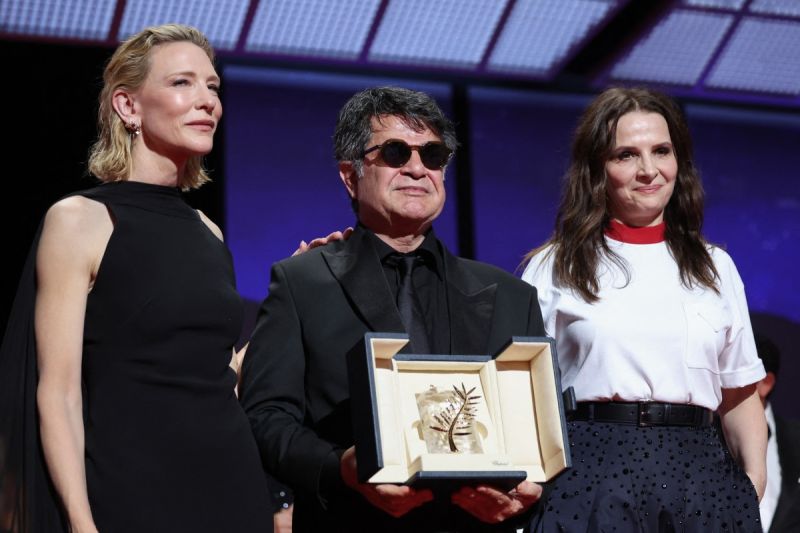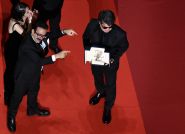
As a massive power outage plunged Cannes into darkness, the light came from Iran. Jafar Panahi’s Just an Accident took home the Palme d’Or — a film confined to a single space, yet expansive in meaning: part political outcry, part quiet meditation on humanity, the film is restrained and deeply affecting.
From the very start of this 78th edition, the tone was set. The official poster, showing a couple running along a beach, taken from Claude Lelouch’s A Man and a Woman, said it all: a nod to romance, but also to the familiar.
This year, Cannes offered both comfort and disruption. Comfort, in the form of familiar faces: Claude Lelouch, Daniel Auteuil, Cate Blanchett, Robert De Niro, Pierre Richard, to name just a few. And disruption through the quiet force of a silenced filmmaker.
Just an Accident, directed by Jafar Panahi — shot covertly and post-produced in exile — emerged as one of the most starkly powerful Palme d’Or winners in recent years. On Saturday, May 24, just hours before the closing ceremony, a major power outage plunged parts of the Provence-Alpes-Côte d’Azur region, including Cannes, into sudden chaos. Authorities later confirmed sabotage as the cause, with some 160,000 households affected.
Thanks to emergency generators rushed in at the last minute, the evening went ahead as planned. Yet, throughout the speeches, one refrain kept coming back: the disruptions and delays caused by the blackout.
For many Lebanese watching from home, a quiet smile was inevitable. In Beirut, private generators have long outperformed the official power grid. Perhaps the ceremony should have been held here, where backup plans are often in place lon.

Iranian director and screenwriter and producer Jafar Panahi on stage with Cate Blanchett and President of the jury of the 78th Cannes Film Festival Juliette Binoche after winning the Palme d'Or for his film Just an Accident.. ©Valery HACHE / AFP
Against all odds, Panahi stood on the Palais stage, his eyes hidden behind dark glasses. He spoke in Persian, his words relayed through an interpreter. In front of him, the film’s team was visibly moved. His presence alone spoke volumes about the sacrifices behind the film.
At 64, Panahi walked the Cannes red carpet for the first time in 15 years. It was here, at Cannes, that he made a direct appeal to his compatriots as he received the Palme d’Or from Cate Blanchett and Juliette Binoche, “Let us put aside all problems, all differences. What matters most right now is our country — and its freedom.”
A message addressed to a people he knows to be as divided as they are silenced. Panahi will soon return among them, having announced his intention to go back to Iran the day after the festival (Sunday) to begin work on his next film, despite the risk of repercussions. He made clear that, although travel and filming bans have been lifted, he will continue shooting discreetly, refusing to submit his projects for official approval and remaining true to his method of working outside the established system.

Iranian director, screenwriter and producer Jafar Panahi (left) and his team celebrate on stage after winning the Palme d’Or for the film Just an Accident.©Valery HACHE / AFP
With this Palme d’Or, Jafar Panahi becomes the second Iranian filmmaker in history to receive Cannes’ highest honor, following Abbas Kiarostami, who won for Taste of Cherry in 1997. Last year, the award narrowly slipped from another Iranian dissident, Mohammad Rasoulof, who remains in exile and had to settle for a special jury prize. This year, Panahi was able to attend the festival in person on the Croisette.
In 2010, Panahi was gravely ill and imprisoned in Iran, weakened by a hunger strike protesting his unjust detention. At that time, Juliette Binoche, already an outspoken supporter, rose to his defense. She made a heartfelt appeal for his release when she received the Best Actress award at Cannes for Certified Copy.
Fifteen years later, the roles have reversed. Now, she is the one presenting him with the Palme d’Or. “It was heartbreaking to see him so close to death,” she said. Yet, that night, he stood there, alive and free. A filmmaker, still and always. This historic tribute confirms Iranian cinema as one of the most vibrant, courageous and insightful voices of our time.
The Ethics of Doubt in Cinema
The premise is simple, or so it seems. Eghbal, an ordinary man, accidentally hits a dog while driving with his pregnant wife. Seeking help, he comes across a remote garage. Vahid, the mechanic, seemingly recognizes him, his former torturer. He takes Eghbal hostage and calls in former cellmates. Together, they stage a makeshift trial. But something isn’t quite right. Memories blur. The man denies everything. The others begin to doubt. The monster may be just an ordinary man after all. And justice turns into a trap.
The entire film hinges on that doubt. And it’s here that Panahi’s power truly shows. He doesn’t try to settle the question. He films men adrift, trapped in damaged memories. His camera is direct, unadorned. The atmosphere recalls a stage play, a suffocating closed space. No music. A deliberate slowness. Every gesture, every glance carries weight. You find yourself holding your breath, as if sealed inside a windowless room.

Poster of the movie Just An Accident © DR
It calls to mind Beckett. 12 Angry Men, for its taut character dynamics. Rashomon, for the clashing recollections. Haneke, too, in the way he films with stark clarity. But Panahi remains entirely himself, a voice that is singular, insistent and deeply tied to Iran. He knows fear, and the silence it imposes. And he films them from within.
Unsurprisingly, critics widely praised the film’s impact. The Guardian’s Peter Bradshaw described it as a rare emotional experience, navigating between state violence and the fabric of daily life. Le Monde highlighted the film’s direct engagement with its subject, linking it to Iran’s “Woman, Life, Freedom” movement. France Culture, for its part, underscored Panahi’s restraint, his ability to capture a face, a silence, a shaft of light.
Since 2010, Iranian authorities have banned Panahi from making films. But he never stopped. From This Is Not a Film (2011), shot inside his apartment, to Taxi Tehran, he has always found ways to bypass the ban, turning every frame into an act of resistance.
Just an Accident, co-produced with French and Luxembourgish companies and finalized in Paris, may well be his most powerful work precisely because it neither seeks to accuse nor explain. It simply shows and lets doubt sink in.
Some actresses are shown without headscarves, quietly defying the Islamic Republic’s laws.
This year’s Cannes festival felt like a curious blend: stars in velvet amidst chaos, a red carpet shadowed by climate concerns, cocktails alongside acts of sabotage. Yet, it held on to familiar anchors. Seeing Claude Lelouch again was a true pleasure. Hearing him on France 2 say, “The director is to cinema what the handrail is to the staircase,” “You don’t direct great actors, you balance them,” and “Directors are life-givers. Cinema is an absolute dream” felt like rediscovering a long-lost wisdom. Perhaps that’s alsso what Cannes is: films that move us, and faces that connect us.

Iranian actress Hadis Pakbaten, Iranian actress Maryam Afsharimovahed, and Iranian actor Majid Panahi. ©Valery HACHE / AFP
That night, the spotlights at the Palais slowly flickered back on. Was it the official power restored, or the lingering breath of the generators? No one knew for sure. But on stage, Jafar Panahi—moved and proud—claimed cinema as an act that requires no permission. Then he spoke these words, a final plea for shared dignity, “Together, let’s ensure that no one dares dictate what clothes we wear, what we say or what we do.”




Comments